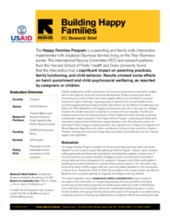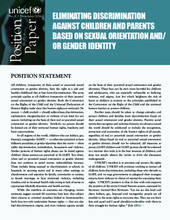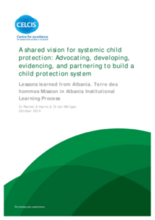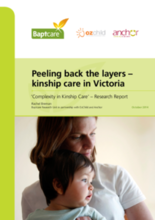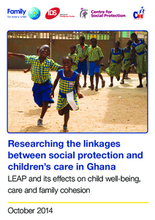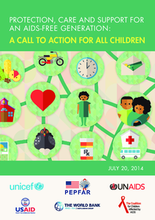Displaying 341 - 350 of 501
This research brief provides an overview of an impact evaluation of the “Happy Families Program,” conducted by the International Rescue Committee (IRC). The Happy Families Program is a parenting and family skills intervention designed for Burmese families living on the Thai-Burmese border.
This position paper from UNICEF clearly states that all children have a right to a safe and healthy childhood, free from discrimination. This discrimination includes discrimination against children based on the real or perceived sexual orientation or gender identity of children or their parents.
This document reports on an Institutional Learning Process that has critically analysed the impact and effectiveness of Terre des hommes’ (Tdh) engagement in Albania over the last 14 years. It looks at the role Tdh has played in the emergence of a State Child Protection System (CPS) in Albania.
Baptcare, OzChild and Anchor - three organizations that provide kinship care services in Victoria, Australia - commissioned this research to explore the impact that complexity in care arrangements has on children and families in kinship care.
This report was written by Keetie Roelen and Helen Karki Chettri from the Centre for Social Protection (CSP) at the Institute of Development Studies (IDS), with inputs and support from Family for Every Child and Challenging Heights, Ghana. The report investigates the links between child wellbeing, children’s care, family cohesion and the Livelihood Empowerment Against Poverty Programme (LEAP), a national social protection scheme in Ghana which aims to reduce extreme poverty in the country and is centred on providing cash transfers to the most vulnerable.
This study involved the use of qualitative methods as part of a larger process evaluation to explore the longer-term experiences of parents who participated in a randomized controlled trial (RCT) of the Incredible Years Parenting Programme (IYPP) in disadvantaged settings in Ireland.
In this TED talk, pediatrician Nadine Burke Harris explains how childhood trauma--such as abuse, neglect and parents struggling with mental health or substance abuse--has real, tangible effects on the development of the child's brain. Children who have experienced high levels of trauma and adverse childhood experiences are at triple the risk for heart disease and lung cancer. This is because of the body's stress response system, which is activated repeatedly during childhood by the adversity.
This article argues that orphanage voluntourism fuels the displacement and trafficking of children from their families in Nepal and their unnecessary institutionalisation.
This call to action is for all who are committed to achieving an AIDS-free generation.
This call to action is for all who are committed to achieving an AIDS-free generation.

